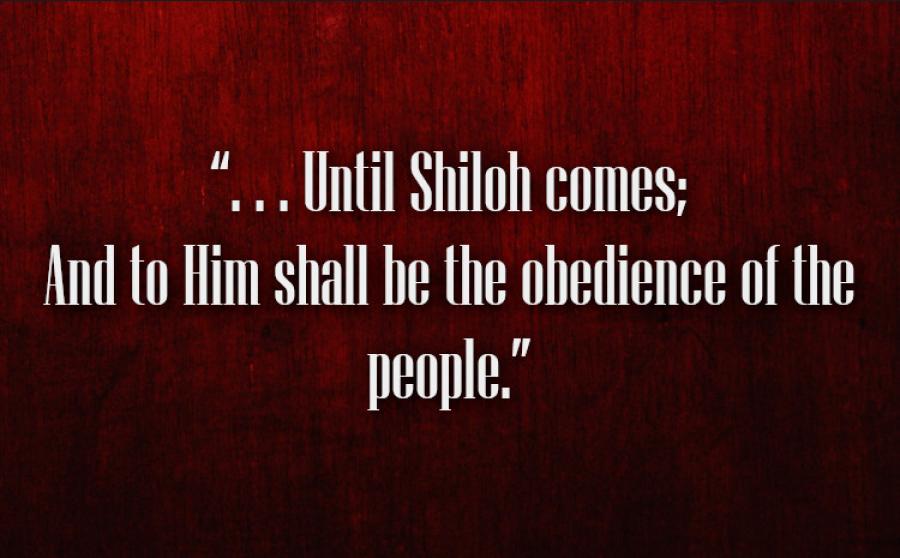Some Little-Known Prophecies of Christmas: Part 4 – Genesis 49:10
Image

Read Part 1, Part 2 and Part 3.
We ended last time by thinking how the Messiah would be the son of Abraham, Isaac, Jacob—and Judah (see Matt. 1:2-3; Lk. 3:33; Heb. 7:14; Rev. 5:5).
Jacob made an astounding and significant prophecy regarding his son Judah, and the greatest descendant who would come through his lineage—giving us one of the earliest glimpses into the Messiah’s future reign as king, “in the last days” (Gen. 49:1).1
As Jacob was blessing his sons in Gen. 49:10, he stated regarding Leah’s fourth son:
The scepter shall not depart from Judah,
Nor a lawgiver from between his feet,
Until Shiloh comes;
And to Him shall be the obedience of the people.
I cannot remember a time in my life when I had not memorized this verse. It was one of many that my classmates and I learned to say verbatim each year in Lutheran grade school in preparation for the annual Christmas Eve services.
Often, as I have referenced this verse in teaching and preaching, I have described it as a promise that we regularly share during the Christmas season. What I found, however, was that I received a lot of blank stares in return, so I no longer speak about it that way. Sadly, I include it here as a “little-known” prophecy.
As we proclaimed this verse together back in grade school, however, I really did not understand all that it meant. I had several questions about it—especially in the King James English in which we memorized it. Perhaps my greatest challenge was understanding why it seemed to refer to Christ as Shiloh.
Shiloh was a village contained in the land of the tribe of Ephraim and the location of the tabernacle (see 1 Sam. 1:3). This name is used 32 times in the Old Testament, including the text under consideration. But is Gen. 49:10 teaching that such a village will move toward an appearance within history?
No, but it wasn’t until seminary that I really came to understand this passage. Dr. John Whitcomb unlocked the puzzle for me when he explained—rather ingeniously, I thought—that Ezekiel supplied the answer to the conundrum, centuries after Jacob prophesied, in Ezek. 21:26-27:2
Thus says the Lord God:
“Remove the turban, and take off the crown;
Nothing shall remain the same.
Exalt the humble, and humble the exalted.
Overthrown, overthrown,
I will make it overthrown!
It shall be no longer,
Until He comes whose right it is,
And I will give it to Him.”
Dr. Whitcomb taught us that those words, “whose right it is” (which, in part, sound similar to “Shiloh” in Hebrew) offer the key that unlocks the meaning of the cryptogram found in Gen. 49:10.3
Ezekiel, by way of predictive prophecy, was describing the forthcoming suspension of the theocracy of Israel, and the halting of the kingly line in Judah. It would not resume until its rightful owner—Shiloh—would appear and reestablish the kingdom.4
Here, then, we see two interwoven prophecies. The latter one builds on the former, which could not be fully understood without the progress of revelation. In the end, we recognize Jacob to be announcing Jesus’ future reign as king.
Christmas is made richer by a right understanding of such hidden gems of prophetic truth, which rest just below our sight, all throughout the Hebrew Bible. It is my hope that the light reflecting off of these gems has served to illuminate your Christmas.
We have unearthed just four of them—all in the book of Geneses. As God enables, I hope to write about more of them during Advent seasons to come.
Unless “Shiloh comes” first.
Merry Christmas!
Notes
1 All Scripture quotations, unless otherwise indicated, are taken from the New King James Version®. Copyright © 1982 by Thomas Nelson. Used by permission. All rights reserved.
2 Dr. Whitcomb discussed these issues on his Encounter God’s Truth radio program on Nov. 9, 2013. Listen to his teaching on SermonAudio.com/Whitcomb, under the title “The Coming King,” at https://www.sermonaudio.com/sermoninfo.asp?SID=117131417116. John MacArthur describes the terminology used by Jacob as “Shiloh, the cryptogram for the Messiah.” See the note on Gen. 49:8-12 in The MacArthur Study Bible, 2nd Edition, ESV (Nashville, TN: Thomas Nelson, 2021), p. 68. The ESV footnote on the same page states: “a slight emendation yields … until he comes to whom it belongs.” The ESV text does not contain the word “Shiloh,” but states in v. 10: “until tribute comes to him.” David Jeremiah writes, “Shiloh means ‘To Whom It Belongs.’” See the note on Gen. 49:8-12 in The Jeremiah Study Bible, NKJV (Franklin, TN: Worthy Publishing, 2013), p. 68.
3 Eugene H. Merrill concurs, seeing “a direct allusion to Gen. 49:10” in Ezek. 21:27. See “Genesis 49:8-12: The Lion of Judah” (pp. 271-284). In Michael Rydelnik and Edwin Blum (Gen. Eds.), The Moody Handbook of Messianic Prophecy (Chicago: Moody Publishers, 2019), p. 282. Merrill also states on p. 284, in footnote 46: “Ezekiel 21:27 uses the same phrase as Gn 49:10, however it is the full expression of the phrase, not the contracted word used in Genesis.”
4 For more occurrences of that blessed word until (where it is used with dispensational significance, showing that God still has a future for Israel), see Matt. 26:29; Lk. 13:35; 21:24; 22:16, 18; and Acts 3:21.
Paul Scharf 2019 Bio
Paul J. Scharf (M.A., M.Div., Faith Baptist Theological Seminary) is a church ministries representative for The Friends of Israel Gospel Ministry, serving in the midwest. He also assists Whitcomb Ministries and writes for “Answers” Magazine and Regular Baptist Press. For more information on his ministry, visit foi.org/scharf or email [email protected].
- 195 views


Discussion